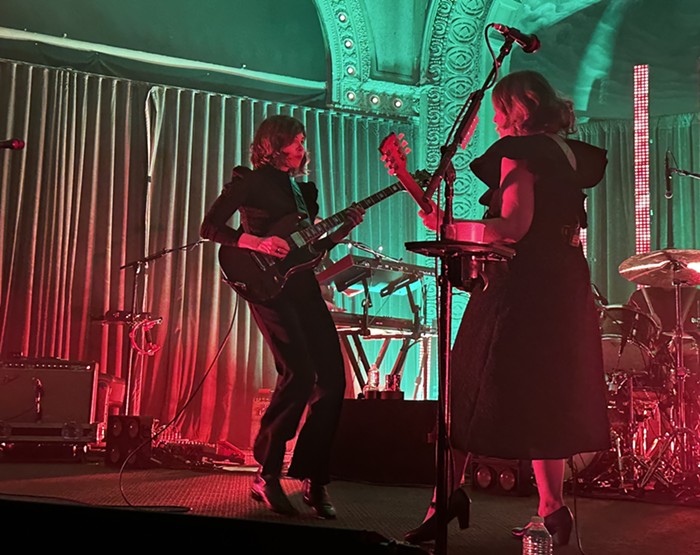AT THIS POINT, maybe it's just funny that there are still misconceptions about metalheads—that they're tattooed, antisocial miscreants who live, breathe, and eat metal (and misery). And, of course, that they don't read books.
Except for maybe the tattoos, Portland doom troupe Usnea couldn't be further from the stereotype. The members trickle into guitarist Johnny Lovingood's North Portland home on a recent afternoon and gear up for practice. Billy Joel's Glass Houses plays on an old refurbished turntable. It's midday, but they're all eating breakfast.
Last month Usnea released their excellent new record Random Cosmic Violence on Relapse, four dour doom songs that could potentially draw some sweeping generalizations. "This album may come off as anti-God, but we don't hate Christians," says guitarist/vocalist Justin Cory. "But I think religion stops scientific progress, and stops forward progress."
Opener "Lying in Ruin" wastes little time sinking its gnarled fangs into religion: "Godless, God blessed/Godhead, behead it." Cory insists he's not a negative person, and I believe him.
"I'm optimistic. Globally, we're more tolerant than we used to be; with climate change, we're becoming more aware," he says, adding that there's still progress to be made. "We try to be nice people... Except for Joel—he's a tyrant."
Bassist/vocalist Joel Williams is actually a nice person, too, although he jokingly plays the part of the antisocial misanthrope during the interview. He and Cory come up with the lyrics, many of which are inspired by books. Random Cosmic Violence takes its title from Carl Sagan's 1995 book, The Demon-Haunted World: Science as a Candle in the Dark, which promotes the use of science and skeptical thinking in everyday life. "We're writing about what it means to be human, and how we all interact with one another," Cory explains.
Those themes run throughout Random Cosmic Violence, bolstered by funereal riffs and cinematic mood swings. Usnea separate themselves from the growing herds of doomsters with their dynamics, most notably on the 15-minute title track, which builds with dark, Bathory-inspired acoustic guitar and monk-like chants before exploding into a bloody inferno. "Some bands are good at milking riffs," says drummer Zeke Rogers. "Our strength is we have a lot of riffs."
The songs were written in the order they appear on the record, and the members say they put a lot of time into the arrangements. Random Cosmic Violence is a bold step forward, retaining the glacial doom of Usnea's self-titled debut (released last year on Rogers' Orca Wolf Records), while including more post-rock ambience. As they put it, the space between the notes is just as important, and the slowed pace allows them to pay more attention to detail.
The record has deservedly received positive reviews—and the band recently played two shows with ballyhooed San Francisco blackish metal band Deafheaven—and Usnea continues its emergence as one of the best doom bands on the West Coast. While more exposure for the band seems inevitable, the guys don't foresee any changes in how they operate. They still book their own tours, and the inspiration for riffs and lyrics still come from the same places.
Which is to say, Usnea will likely continue to dismantle organized religion and question humanity. As we wrap up, Cory is sure to tell me another reason he's optimistic about humankind. "The things we say on the record, if we said it 100 years ago we would've been killed."



















